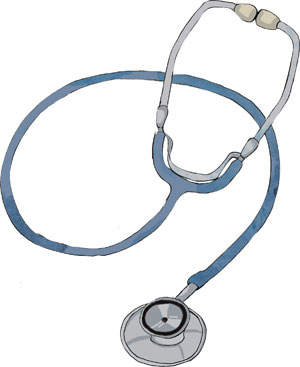
As budgets tighten in the current economic environment, luxuries and inflated expat packages are also shrinking. Some people are scaling back their spending by moving from the suburbs to the central business district, relocating to a smaller apartment, or eliminating a car and driver. Healthcare is a high cost in any budget, and when you are paying as much or more than in your home country, it’s worth your while to explore whether it’s possible to cut expenses there as well – without sacrificing quality. In fact, it’s never a bad idea to reevaluate your medical needs and the toll they take on your budget, especially if you are paying for it yourself.
When I arrived in China from the US, the first thing on my checklist of things to do was to find a hospital for my family. I was looking for a place where they would be able to understand and communicate effectively with me and have the best medical expertise to deal with any conditions that might arise. I looked into the international hospitals and clinics: Beijing United Family Hospital, International SOS, Vista. They all seemed adequate for my needs.
I soon learned, however, that local hospitals do provide adequate care as well, usually for a much lower price. They are well-staffed and see a large number of patients. In fact, local doctors are highly skilled and are often consulted by the international clinics. The drawbacks, though, include waiting in long lines (and in China that means maintaining your place in line vigilantly); by the time you see the doctor, while you may be accessing top-notch expertise, the line coming right into the examination room may make it difficult to get the privacy or detailed explanation you were hoping for.
One winter, after a bout with the flu, my son had infections in both ears and a ruptured eardrum. When we went to the Vista Clinic near our house in the CBD, they decided to bring in an ENT (Ear-Nose-Throat) specialist from nearby Chaoyang District Hospital to check him out. I was pleasantly surprised at how quickly the doctor was able to arrive – and that he spoke English well. Even so, I am personally willing to pay prices comparable to the US for English-speaking and foreign-trained doctors, the convenience of an appointment, and a clean, private environment.
Local or International Hospital?
Children tend to need doctor’s visits more often than adults – to get vaccinations, to address colds and minor illnesses, to soothe skin irritations and to patch up the bumps and bruises of childhood. For infants, the check-up schedule is even more frequent, as parents consult pediatricians about developmental progress or seasonal illnesses. In considering the convenience and quality of a healthcare provider, parents in Beijing often take into account the availability of international vaccinations (as opposed to locally produced medications), the speed and care of the nursing staff in administering the vaccination, and the overall length of time of the appointment (from waiting to check-out). There are trade-offs. Certainly Beijing United Family Hospital (BJU) is a pro at administering vaccinations; they can arrange to have several nurses there to give all the shots at one time and your child’s vaccination card can be updated in 15-20 minutes, including the observation time. But, their pediatricians are on rotation, so you may not see the same pediatrician twice – which some parents may view as affecting the consistency of the care their children receive.
Other international clinics are smaller, which can allow for a more personal touch, but they may not be able to provide vaccinations with the same speed and efficiency, making the overall visit a little longer.
 Many expats will never consider exploring healthcare options outside of those that cater specifically to the Westerner. Frankly, it can be intimidating. Figuring out where to go and how to navigate the system once you’re there can cause trepidation and frustration in even the most seasoned expat. However, for those without insurance or an expat package, it’s sometimes necessary to look for more economical alternatives without sacrificing quality.
Many expats will never consider exploring healthcare options outside of those that cater specifically to the Westerner. Frankly, it can be intimidating. Figuring out where to go and how to navigate the system once you’re there can cause trepidation and frustration in even the most seasoned expat. However, for those without insurance or an expat package, it’s sometimes necessary to look for more economical alternatives without sacrificing quality.
Canadian Karen Patterson, the mother of a 5-year-old, has experience with both international and local hospitals. When her daughter Hannah was an infant, she didn’t hesitate to take her to BJU; she didn’t want to brave the crowds at a local hospital and strain to figure out what was being said. Now that her daughter is older, though, she takes her to the Capital Institute of Pediatrics near the west gate of Ritan Park. Patterson says that while she compromises on privacy and puts up with the lines and crowded, messy waiting rooms, the actual knowledge and expertise of the doctors is very good. “These doctors see 300 patients a day. They have enormous caseloads, so they have undoubtedly seen it all before,” she notes.
Patterson, who is not on an expat package, was able to find individual, emergency health insurance for her daughter (and for herself) through a company called Expatriate Solutions. Her daughter’s insurance policy has a deductible of RMB 350. That deductible comes in handy when they need to go to BJU or SOS, but it is more than they would pay at a local hospital. For run-of-the-mill concerns, they head to the Capital Institute of Pediatrics. There, she recently paid less than RMB 200 for a consultation about a skin condition, and the whole process took less than 2.5 hours. She was also happy with the medication that was prescribed. For situations when Patterson wants more detailed explanations and more time with the doctor, she opts for BJU.
Patterson speaks Chinese well, but her medical vocabulary is limited, so she brings along her husband, a Chinese national, or her ayi to assist with the translation.
Some parents who rule out local healthcare options for their children may be more willing to consider it for their own medical needs. For them, there are many local hospitals to choose from; several have special sections for foreigners as well as some English-speaking doctors. The most well-known of these options is Peking Union Medical College Hospital (known in Chinese as Xiehe) in Wangfujing. It has a special wing for foreigners, but because it is such a prestigious hospital, there can be a long wait. The adults in Patterson’s household visit Beijing Chaoyang Hospital, located on Chaoyangmenwai Beilu north of The Place. Patterson has been pleasantly surprised with the cleanliness and efficiency of the hospital. Her two most recent visits took about one hour each. The Chinese doctors prescribed Western medicine (manufactured by joint-ventures) that was appropriate and worked for their treatment. Again, she paid about RMB 200 each time.
Emergency Care
Annika Due Cornet is a Danish nurse who works for Euro-Center China, which provides medical assistance for expats and travelers insured by the health insurance providers they service. In cases of emergency, Cornet says, most expats choose to go to BJU where the doctors can provide emergency treatment to a standard they are accustomed to. It is important to keep in mind, though, that the focus of emergency medicine is on stabilization, and that one should follow up with a specialist, if necessary, once the urgent care needs are under control.
Another medical resource that expats should know about is the ambulance service that can be reached by calling 999 or 120. This is a public service not affiliated with a particular hospital. The operators do not speak English, but can dispatch an ambulance with basic equipment and a nurse or doctor based on specific needs, says Cornet. In emergency situations, most expats choose to hail a taxi to get to the hospital of their choice, but in cases where a stretcher or on-route treatment might be necessary, it is handy to know this ambulance service exists.
 Trade-Offs
Trade-Offs
There is ample and qualified medical care throughout the city – enough varied options to provide every family with the opportunity to find healthcare of a standard they are comfortable with and a cost they can afford. When looking for specialists, expats should rest assured that the local hospitals have sufficient expertise and will consult with the international hospitals when appropriate. If your Chinese language is up to par, or you have some Chinese language assistance, you may decide to bypass the international hospitals and go directly to the local hospital. You will pay less, but have to forgo the convenience of having an appointment – instead getting a number and waiting in line. Patterson compares healthcare to other essential aspects of expat life, like schooling and housing. She advises other expats to keep in mind that they have a lot of choices as they consider the trade-offs between cost, experience and quality.
Over-the-Counter Meds
Over-the-counter Western, adult medication can be found at Watson’s and other pharmacies around Beijing. Children’s over-the-counter medication though, is a little tougher to find. All of the international hospitals and clinics have pharmacies attached, and carry children’s over-the-counter medication like fever reducers, children’s allergy medication, and children’s decongestant. Even without seeing the doctor, you can request over-the-counter medication at the pharmacy counter. It may not be as easy as going to the corner drugstore or chemist in your home country. The pharmacy will ask you the age of your child and symptoms to ensure the right dosage and medication. Having a place where you can buy children’s Tylenol, ibuprofen, and Dimetapp rather than just stocking up on home trips may reduce the number of times you have to see the doctor or at least reduce the number of doctor’s visits per sickness.
Western over-the-counter medications for children are available at Vista Clinic, SOS International, BJU and BJU St. Regis and Shunyi, Bayley & Jackson.



